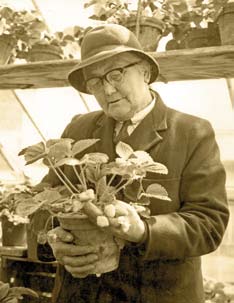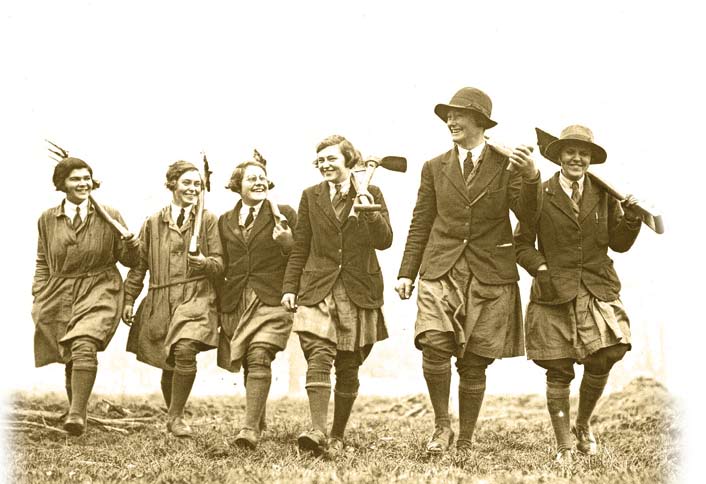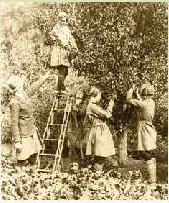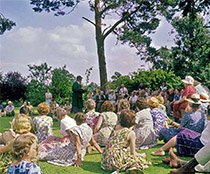About Waterperry
The heritage of the horticultural school, run by the redoubtable Beatrix Havergal with her partner Avice Sanders, remains at the core of what we do at Waterperry with the sharing of knowledge of staff with visitors and apprentices alike.
The gardens themselves are evidence of Beatrix’ horticultural virtuosity, in particular the classical herbaceous border. This remains an object of admiration to visitors by virtue of the gardeners’ continuing faithfulness to its original conception. Although the teaching school left its mark on the gardens, these were principally established for educational purposes, including the striking ‘living catalogue’ of herbaceous plants. Yet, since the closure of the school, extensive developments have taken place in the gardens under the auspices of the present owners, The School of Philosophy and Economic Science, far beyond their scope when purchased in 1971.
The gardens now occupy 20 acres. Bernard Saunders and Mary Spiller were responsible for this development through their combination of artistic and horticultural expertise. This has resulted in a number of planted spaces that bring together geometrical and aesthetic principles with brilliant plant selection. The result is an uplifting and often surprising experience for visitors. These elements will remain uppermost in developments that are currently in the design stage and as the gardens continue to develop in the future.
We welcome you to Waterperry Gardens and hope that you will discover the spirit of Waterperry with us.

Beatrix Havergal, 1951, admiring a prize Royal Sovereign strawberry plant.
Beatrix Havergal & Waterperry
Beatrix Havergal and Avice Sanders became friends in the early 1920s whilst on the staff of Downe House School. With the headmistress’ blessing they departed in September 1927 to establish the gardening school that Beatrix had dreamed of running. They rented a small cottage and 2 acres of walled gardens in the grounds of Pusey House near Faringdon where they received their first students. Their prospectus stated that ‘the training will consist of a theoretical and thoroughly practical training in the various branches of horticulture, including soils and manures, glasshouse management, pruning and garden construction’.
In the early days before they established Waterperry Horticultural School, it was the willingness to surmount adversity with great fortitude and common sense that showed Miss Havergal to be a very singular woman of formidable determination.

Shovels at the ready, Beatrix and students select the right tools for the task. Pusey 1931
Waterperry And The War Years
The breakthrough came in the form of an enquiry made by a wealthy Swiss academic, Professor Reinhart. He prophesied a sound future for Miss H’s enterprise, telling her, “I see you in a large rectangular country house among trees, Miss Havergal. Look for it.” In 1931 came news that Magdalen College Oxford were looking for new tenants for Waterperry House, near Wheatley – the country house that the professor had prophesied. Miss H took over the Waterperry lease in September 1932 and spent the first five years preparing the land, felling and clearing trees, building glasshouses and improving the soil for production.
The Prophecy
With the outbreak of World War II Waterperry was turned by Miss H into a market gardening operation, producing much-needed food. The task was to keep the school operating as a going concern, whilst adding to the war effort by accommodating the arrival of the Women’s Land Army personnel. They were soon put to work ploughing and digging for victory.
Land Army girls joined the existing staff and students and gardening courses were held on the last Saturday of the month called ‘Dig For Victory Demonstrations’ to teach people how to grow their own food. By now Waterperry had become an established and well-respected school.

1931. Autumn at Pusey
The Final Years Of The School And Beyond
The last decade of the Gardening School took its toll on the ageing Miss Havergal and Miss Sanders. Miss S died in her sleep at the age of 75 on 20th August 1970 and is buried in the churchyard at Waterperry. She is commemorated by a plaque in the church.
Miss H was desperate to secure a continuity for Waterperry and in 1971 put the estate on the market for sale. There was interest from the Subud group, who remarked at the time: ‘As one enters the gate, one knows that here is an enterprise which has been the long preoccupation of the past forty years of a group of devoted people. Every plant in the ground and in the greenhouses proclaim this loving care, this spiritual link with the soil. Waterperry is a place to love – it needs love and it gives it back’. However it was The School of Philosophy and Economic Science who eventually bought the estate, and from August 1971 the Waterperry Horticultural School for ladies was no more.

Public Demonstration by Beatrix Havergal at Waterperry Gardens. Beatrix Havergal pictures courtesy of Lindley Library.
What Is The School Of Philosophy and Economic Science?
The School of Philosophy and Economic Science has its origins in the 1930s, against the background of severe economic depression. Its founder, Leon MacLaren, was inspired by the work of the nineteenth century economist Henry George. George held that everyone owns what they create, but that everything found in nature, most importantly land, belongs equally to all humanity.
In 1937, MacLaren founded the Henry George School of Economics, the first public courses being held in the same year with the active support of his father, Andrew MacLaren MP. The school was renamed the School of Economic Science in 1942 and again in 2019 to The School of Philosophy and Economic Science as it is known today.
Leon MacLaren continued to develop the courses in economics, writing ‘The Nature of Society’ as a textbook. The last chapter of this book reflects his search for something not altogether accessible within the realm of economics. This lead to an interest in philosophy – ‘the love of wisdom’ – as a means of gaining deeper insights into the natural laws governing humanity, and the origin of those laws. After coming in contact with the Study Society in the early 50s, he discovered the teachings of Ouspensky and Gurdjieff. He was taken by the similarities between diagrams developed for the economics courses and those used by Ouspensky.
The first public courses in philosophy started in 1954, and within a few years philosophy became the central subject of study and practice within the School (economics courses have continued and there remains today a thriving economics faculty within the School).
The arrival of Maharishi Mahesh Yogi in London in 1959 brought the next stage of development, meditation. This was soon taken up by longstanding students of the School and continues to be an important part of the teaching.
In the mid-60s, the School made contact with a leading figure of the Vedantic tradition in India, Maharaja Shri Shantananda Saraswati, from whom it received invaluable guidance in the study and practice of philosophy for over 30 years. Through this connection, the School was introduced to the universal teaching known as Advaita, which means literally ‘universal’ or ‘devoid of duality’. Since the Maharaja’s death in 1997, similar guidance has been provided by his successor, Shri Vasudevananda Saraswati.
The School has expanded geographically so that courses in philosophy, and sometimes other subjects, are now available through more than 40 branch locations in the UK. A number of associated overseas schools have also been established. Each is legally independent, but shares a common interest and bond through the same philosophical teaching.
Leon MacLaren died in 1994 and was succeeded by Donald Lambie, a barrister.
Waterperry House is used on weeks and weekends for study groups and retreats throughout the year. You can visit the house and do a Fresco tour on Wednesday and Friday afternoons at 2pm.
Find out more about The School of Philosophy and Economic Science.




